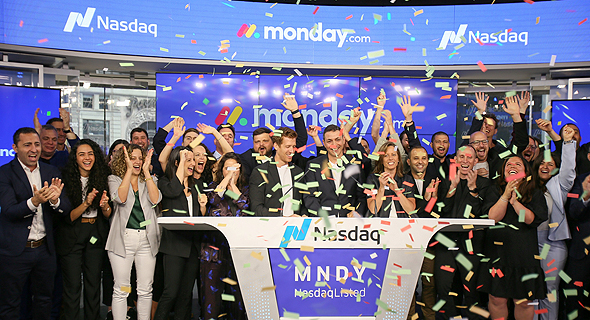What you must know when your company goes public
The recent wave of Israeli tech IPOs is only gathering pace, and there are numerous ways in which this big change affects the company, management and employees
10:3126.06.21
The recent wave of Israeli tech companies going public on local and international stock exchanges is showing no signs of slowing down. ironSource, Monday.com, WalkMe, and Payoneer are only a few examples of startups that are turning into publicly traded companies. It is a change with many ramifications, both on management and workers, especially when it comes to compensation and salaries. One of the significant changes an IPO brings is the requirement for transparency, public scrutiny, and formal approval processes including regarding remuneration.

monday.com's Nasdaq IPO earlier this month Photo: Nasdaqצילום: Nasdaq
"On the part of the company, it is important to understand that de-facto everything becomes public. The company's financial statements, including the salary information of the company's five highest-paid individuals, are published to the public every year. The company is obligated to publish its compensation policy and it cannot deviate from it without a general meeting’s permission. Companies issuing for the first time have a window of opportunity to formulate a five-year remuneration policy without the need for such approval. Therefore, despite the time pressure for publishing the prospectus, it is important to establish a policy that is consistent with the company's needs, the strategy going forward, and following market norms and the requirements of the Securities Authority,” said Avi Nir, founder, and CEO of CompVision. “Decisions on officials’ salaries are usually made by a remuneration committee and board of directors and in exceptional cases even require the approval of a general meeting. Now, not only the founder, the board of directors, or the management are involved in determining the salary."
The transition from a startup company to a public one also requires significant changes in internal conduct, new managerial routines are created and considerations of public visibility carry significant weight in the decision-making process. On the part of the workers, their professional stock could rise thanks to an IPO with competing companies trying to ‘steal’ them away. "An IPO is usually a well-publicized event and the spotlight often brings a wave of courtship by competing companies and recruiters targeting the company's employees. The company itself is also looking for employees with experience working in public companies, hence another window of opportunity, this time for employees and managers with relevant experience, to join the company," said Keren Mangoubi, CompVison VP. “In addition, if the startup’s main remuneration components were salary, benefits, and stock options, after the IPO the options component usually grows smaller, and sometimes a result-dependent bonus component is introduced. About six months after the IPO, you can realize the matured capital reward components."

Playtika's Nasdaq IPO in January 2021 Photo: Reutersצילום: רויטרס
As for options, these have become one of the main currencies companies have to offer in an attempt to differentiate themselves in the competitive Israeli tech landscape. "Employees today understand that companies are targeting higher than ever. A billion-dollar value can allow even a relatively junior employee to earn life-changing sums of money," said Shelly Hod Moyal, founder of investment platform iAngels. “When done right, it allows the company to instill a real sense of partnership within an employee. When he or she gets a future share of the company's success they get a sort of owner's pride, and the more people think of the company as their own, the more likely they are to make the right decisions for the organization and remain a part of it in the long run. To achieve this, the most significant principles are transparency and fairness in creating an options plan. It is important to communicate simply and clearly what the company's long-term financial goals are and to help employees understand the potential value of their options upon achieving these goals. When it comes to transparency, it is even worthwhile to treat key employees as investors - who invest their energy and time for the benefit of the company's success."
So what are your options and could they be taxed?
An option that is given to employees is in fact a right to purchase company shares of a certain kind at a predetermined price and for a specified period. In most cases, the option cannot be exercised immediately (meaning the purchase of the share), but only following a vesting period that is determined in advance and reflects the company's policy in general. "The purpose of the options is to create an incentive for the employee to join the company and stay there by creating shared interests between the employee and the company's shareholders, offering him or her a stake in the company’s stock," explained Adv. Oren Sharon, head of the high-tech department at S. Friedman & Co.
A company can offer its employees options at any stage, except for some special cases. Private companies usually grant options at significant rates in their initial stages when cash flow is in short supply or it is difficult to finance salaries. "Options are a tool in the hands of a company to compensate employees for a lower salary level than they could have received in another company in a similar position," Sharon said. Accordingly, the options rate offered to employees usually decreases as the company progresses and stabilizes and can afford to pay salaries and provide terms of employment appropriate to market conditions. In addition, there are scenarios in established private companies and public companies where options are granted when the company manages an options program or compensation policy for employees or executives that regulates the terms of the options for employees to recruit new talent.
Options can be exercised (meaning the purchasing of shares) only when the agreed upon time has passed in accordance with the conditions made in exchange for the price agreed with the company. "In many cases, there is an increase in options exercised before significant events in the company's lifecycle, such as an 'exit' transaction, an IPO or shares purchased from existing holders in the company (Secondary Sale)," Sharon added.
Options taxation in Israel usually goes through one of two tracks - 102 and 3(9). Track 102 is relevant for employees and company officials who hold less than 10% of the shared capital. “In this route, the employee is required to hold his options through a trustee for at least two years. The tax rate that the employee will be required to pay in respect of the sale of shares held in accordance with the provisions of track 102 is a 25% capital gains tax, derived from the profit generated by the employee from his shares," Sharon explained.
The second route, track 3 (9), is relevant for anyone who is not classified under route 102 (meaning those who hold more than 10% of the shared capital). "The tax rate on the exercising of the options under this route is the tax that the employee is required to pay for income from work. The tax event in this route is the time at which the options are exercised," he said.



